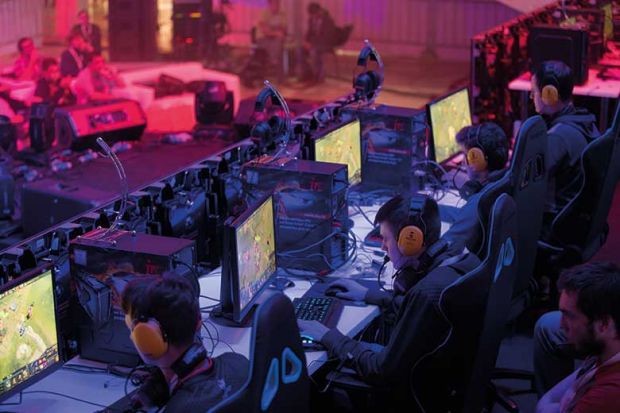An archive of Russian “troll factory” tweets shows the scale of its activity on free speech and perceived left-wing bias rows at universities – part of a strategy to “push partisan hot buttons” on the right and polarise debate, according to the academic who gathered the material.
With claims that free speech is under attack in universities spreading beyond the US and now routinely levelled by sections of the right in the UK, Australia and Canada, evidence from the archive suggests that the US debate on the topic was among the range of divisive issues exploited by the St Petersburg-based Internet Research Agency.
The tweet archive comes from now-deleted accounts flagged by Twitter to the House Intelligence Committee as being associated with the agency, owned by an associate of Russian president Vladimir Putin. The messages, the majority of which were posted between 2015 and 2017, were gathered by Darren Linvill and Patrick Warren of Clemson University in South Carolina.
The archive has helped shed light on the way that the Russian IRA sought to widen divisions in the US by tweeting about polarising issues, such as Black Lives Matter, from both left- and right-wing perspectives.
But the significance of the material on higher education has yet to be fully grasped, said Dr Linvill, an associate professor in Clemson’s department of communication. Previous analysis of Russian trolls’ tweets about US higher education was based on an NBC News sample of messages that was far more limited in timescale and coverage, he said.
Dr Linvill highlighted the higher education-related activity of three accounts – @TEN_GOP, @Pamela_Moore13 and @Jenn_Abrams – which he said were the IRA’s biggest right-leaning US accounts in 2016 and early 2017. “Just the very fact they sent out original tweets on that subject, from all three of those accounts, shows that’s something they actively chose to care about,” he said.
Across all Russian IRA accounts the phrase “liberal professor” was used in 80 different messages and “professor” in 1,724, the archive reveals. For example, the @Jenn_Abrams account tweeted about a media controversy over an Arizona State University professor who supposedly “offered her students to protest Trump instead of passing finals. No bias, right?”
Dr Linvill said that in another high-profile controversy, over a Drexel University professor who tweeted that “All I want for Christmas is white genocide”, “a minimum of 15 per cent and maybe as much as 25 per cent of the total Twitter volume on that story was generated by the Russian IRA” and those accounts “had more retweets than the CNN post did on the same story”.
The @TEN_GOP account – which purported to be linked to the Tennessee Republican party and amassed 130,000 followers – tweeted 45 separate messages between February and June 2017 about the University of California, Berkeley, which became a target after it cancelled a talk by alt-right commentator Milo Yiannopoulos on safety grounds.
Data from Twitter’s own IRA archive (which mirrors the Clemson archive but additionally includes figures on engagement) show that 28 messages mentioning Berkeley from the @TEN_GOP, @realTEN_GOP and @Pamela_Moore13 accounts gained more than 1,000 retweets – one achieving as many as 7,808 retweets.
After Donald Trump threatened to withdraw Berkeley’s federal funding in February 2017, @TEN_GOP gained 5,847 likes and 3,533 retweets for a message that read: “Here’s an idea: let’s take Berkeley’s $350 mil fed funding away and use the money to build the border wall (dedicate that part to Berkeley).” The same account gained 3,894 likes and 3,059 retweets for a message in relation to efforts by Mr Yiannopoulos and Conservative commentator Ann Coulter to appear at Berkeley: “A woman and a gay man banned by the Left from speaking at Berkeley. That speaks volumes.”
Dr Linvill said that one motivation behind the higher education-related activity was that these IRA accounts wanted to “look like the thing they are trying to mimic”, so seized on issues favoured by US right-wing social media accounts.
But controversies over professors’ political views and free speech were also seen as “wedge issues” that can divide left and right, he said.
Others have seen a wider Russian disinformation aim of “weakening Western democracies by undermining trust in institutions”.
“They attack higher education from the right and that is how they connect with an audience, push partisan hot buttons, and appear authentic. They also want to attack established institutions. They similarly attack science, the media, and the electoral process,” Dr Linvill said.
Johan Farkas, a doctoral student at Malmö University, who co-authored a paper on Russian IRA strategy, agreed that the agency “specifically targeted ‘hot button’ issues to destabilise public debates”.
“The issue of free speech…at universities fits well with this aim, especially considering how they operated numerous accounts claiming to belong to white conservative hardliners. Through these fake profiles, the Internet Research Agency amplified polarising and antagonistic viewpoints on a range of issues, including free speech,” he said.
POSTSCRIPT:
Print headline: Russian trolls used campus rows to widen US divisions
Register to continue
Why register?
- Registration is free and only takes a moment
- Once registered, you can read 3 articles a month
- Sign up for our newsletter
Subscribe
Or subscribe for unlimited access to:
- Unlimited access to news, views, insights & reviews
- Digital editions
- Digital access to THE’s university and college rankings analysis
Already registered or a current subscriber?








